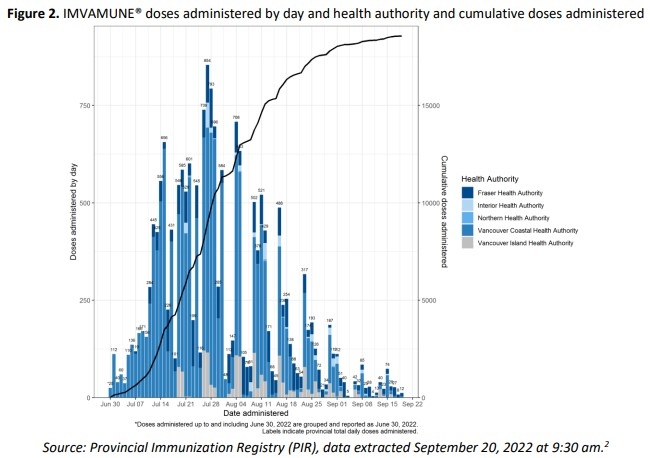Rate of new monkeypox cases 'may be starting to decline' in B.C.: health officials
 A woman administers the monkeypox vaccine at a walk-in clinic at the North Jersey Community Research Initiative in Newark, N.J., Tuesday, Aug. 16, 2022. (AP Photo/Seth Wenig)
A woman administers the monkeypox vaccine at a walk-in clinic at the North Jersey Community Research Initiative in Newark, N.J., Tuesday, Aug. 16, 2022. (AP Photo/Seth Wenig)
The rate of new monkeypox cases may be decreasing in B.C. after months of stability, local health officials say.
As of Wednesday, there were 158 cases confirmed in B.C., marking an increase of 33 cases from about a month ago.
In a surveillance report issued this week, the B.C. Centre for Disease Control said weekly incidence of confirmed cases was stable in July and August and "may be starting to decline." The centre also reiterated that the "vast majority" of cases were likely transmitted through close, intimate contact during sex.
The majority of cases, 129 of them, were reported in the Vancouver Coastal Health Region. Seventeen were reported in Fraser Health, six in Island Health and six in Interior Health, according to the BCCDC.
Across Canada, 1,379 case were confirmed as of Sept. 21. About 86 per cent of Canada's cases were reported in Ontario and Quebec.
B.C.'s first case was announced on June 6, though data from the BCCDC shows that cases were confirmed on May 22 and 29.
 Monkeypox epidemiological curve for B.C. as of Sept. 20, 2022. (BCCDC)
Monkeypox epidemiological curve for B.C. as of Sept. 20, 2022. (BCCDC)
THOUSANDS OF VACCINE DOSES
In B.C., more than 18,000 doses of the Imvamune vaccine have been administered in an effort to reduce case counts. Most doses were given in July and August, though some got a shot in September.
Health authorities have restrictions on who can get a vaccine because of limited supply.
"Misidentifying oneself as eligible for monkeypox vaccine directs this critical tool away from people most at risk, and limits its utility in preventing onward transmission, and from protecting the wider population from a bigger outbreak," a notice from Vancouver Coastal Health says.
Vancouver Coastal Health says two-spirit, transgender people and cisgender men who self-identify as belonging to the gay, bisexual and other men who have sex with men community are eligible. It's also available to people who have been identified as a close contact of a confirmed case.
Those with symptoms that could be from monkeypox can't get a vaccine.
 Monkeypox vaccine administration in B.C. as of Sept. 20, 2022. (BCCDC)
Monkeypox vaccine administration in B.C. as of Sept. 20, 2022. (BCCDC)
WHAT ARE THE SYMPTOMS?
There are two stages of symptoms, though some don't experience them in order, or may not experience both.
Stage 1 includes fever, chills, "intense headache," swollen lymph nodes, back pain, muscle pain and fatigue, the BCCDC says. Some also experience sore throat, cough, nausea, vomiting or diarrhea.
Stage 2 typically starts one to five days later, and this is when the "pox" appear.
Sores, blisters or a rash – often on the hands, feet, legs, mouth, arms and genitals – can change appearance, eventually scabbing and falling off. This can last up to two weeks.
Anyone who's been exposed is asked to monitor themselves for symptoms, keeping in mind they may not notice anything for as long as three weeks. They should contact their regional health authority if they haven't been contacted already.
Those who fall ill with what they think is monkeypox need to contact a doctor to get tested as soon as possible. While they wait for confirmation, they should avoid close contact with others, and not share towels, clothing, sheets or other things that come in contact with the skin.
With files from CTV News' Kendra Mangione
CTVNews.ca Top Stories

Spectacular aurora light show to be seen across Canada Friday night
A rare and severe solar storm is expected to bring spectacular displays of the northern lights, also known as aurora borealis, across much of Canada and parts of the United States on Friday night.
Town of Fort Nelson, B.C., ordered to evacuate due to wildfire
The entire town of Fort Nelson, B.C., as well as the nearby Fort Nelson First Nation, has been ordered to evacuate due to an out-of-control wildfire.
Bouchard lifts Edmonton Oilers to 4-3 overtime win over Canucks in Game 2
Evan Bouchard scored 5:38 into overtime and the Edmonton Oilers bounced back for a 4-3 win over the Vancouver Canucks in the second round of the Stanley Cup playoffs on Friday.
McGill University seeks emergency injunction to dismantle pro-Palestinian encampment
McGill University has filed a request for an injunction to have the pro-Palestinian encampment removed from its campus.
Which Canadian cities have the highest and lowest grocery prices?
Where you live plays a big factor in what you pay at the grocery store. And while it's no secret the same item may have a different price depending on the store, city or province, we wanted to see just how big the differences are, and why.
Swarm of 20,000 bees gather around woman’s car west of Toronto
A swarm of roughly 20,000 bees gathered around a woman’s car in the parking lot of Burlington Centre.
Video shows naked raccoon catching B.C. family by surprise
When Marvin Henschel spotted a strange and hairless creature wandering through a front lawn in B.C.'s Lower Mainland, he could barely believe his eyes.
Barron Trump declines to serve as an RNC delegate
Former U.S. President Donald Trump's youngest son, Barron Trump, has declined to serve as a delegate at this summer’s Republican National Convention, according to a senior Trump campaign adviser and a statement from Melania Trump's office.
Out-of-control wildfire prompts evacuation alert for Fort McMurray, Saprae Creek Estates Friday night
An evacuation alert was issued for two Wood Buffalo communities Friday night, as crews battled an out-of-control wildfire near Fort McMurray.































